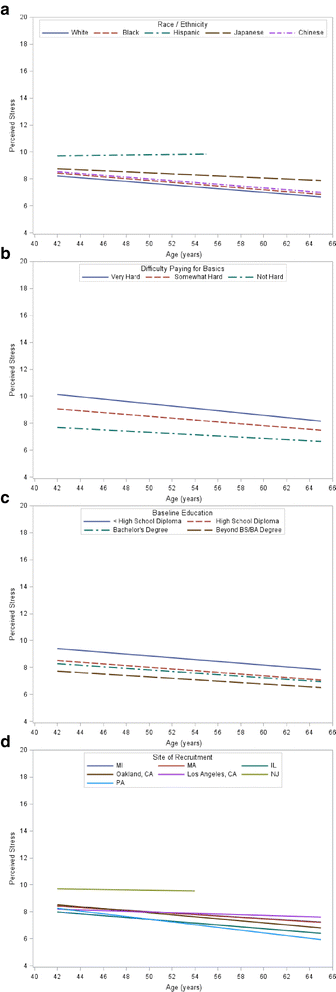Perceived stress across the midlife: longitudinal changes among a diverse sample of women, the Study of Women's health Across the Nation (SWAN)
- PMID: 29973982
- PMCID: PMC6027744
- DOI: 10.1186/s40695-018-0032-3
Perceived stress across the midlife: longitudinal changes among a diverse sample of women, the Study of Women's health Across the Nation (SWAN)
Abstract
Background: In women, midlife is a period of social and physiological change. Ostensibly stressful, cross-sectional studies suggest women experience decreasing stress perceptions and increasing positive outlook during this life stage. The aim of this paper was to describe the longitudinal changes in perceived stress as women transitioned through the midlife.
Methods: Premenopausal women (n = 3044) ages 42-52 years at baseline, were recruited from seven sites in the Study of Women's Health Across the Nation, and followed approximately annually over 13 visits with assessment of perceived stress and change in menopausal status. Longitudinal regression models were used to assess the effects of age, menopausal status and baseline sociodemographic variables on the trajectory of perceived stress over time.
Results: At baseline, mean age was 46.4 ± 2.7 years; participants were white (47%), black (29%), Hispanic (7%), Japanese (9%), or Chinese (8%). Hispanic women, women with lesser educational attainment, and women reporting financial hardship were each more likely to report high perceived stress levels at baseline (all p < 0.0001). After adjustment for baseline sociodemographic factors, perceived stress decreased over time for most women (p < 0.0001), but increased for both Hispanic and white participants at the New Jersey site (p < 0.0001). Changing menopausal status was not a significant predictor of perceived stress.
Conclusions: Self-reported stress decreased for most women as they transitioned across the midlife; changing menopausal status did not play a significant role after adjustment for age and sociodemographic factors. Future studies should explore the stress experience for women by racial/ethnic identity and demographics.
Keywords: Aging; Epidemiology; Menopausal transition; Minority health/disparities/SES; Stress; Women’s health.
Conflict of interest statement
Competing interests The authors declare that they have no competing interests.
Figures

Similar articles
-
The role of family history of depression and the menopausal transition in the development of major depression in midlife women: Study of women's health across the nation mental health study (SWAN MHS).Depress Anxiety. 2017 Sep;34(9):826-835. doi: 10.1002/da.22651. Epub 2017 May 10. Depress Anxiety. 2017. PMID: 28489293 Free PMC article.
-
It is not just menopause: symptom clustering in the Study of Women's Health Across the Nation.Womens Midlife Health. 2017;3:2. doi: 10.1186/s40695-017-0021-y. Epub 2017 Jul 27. Womens Midlife Health. 2017. PMID: 29326841 Free PMC article.
-
Racial/ethnic differences in social support and health among Asian American and non-Hispanic White midlife women: Results from the Study of Women's Health Across the Nation (SWAN).Ethn Health. 2023 Feb;28(2):182-199. doi: 10.1080/13557858.2022.2035691. Epub 2022 Feb 9. Ethn Health. 2023. PMID: 35138201
-
Depressive symptoms during the menopausal transition: the Study of Women's Health Across the Nation (SWAN).J Affect Disord. 2007 Nov;103(1-3):267-72. doi: 10.1016/j.jad.2007.01.034. Epub 2007 Feb 28. J Affect Disord. 2007. PMID: 17331589 Free PMC article.
-
Disparities in Reproductive Aging and Midlife Health between Black and White women: The Study of Women's Health Across the Nation (SWAN).Womens Midlife Health. 2022 Feb 8;8(1):3. doi: 10.1186/s40695-022-00073-y. Womens Midlife Health. 2022. PMID: 35130984 Free PMC article. Review.
Cited by
-
Physiologic and psychosocial changes of the menopause transition in US Latinas: a narrative review.Climacteric. 2021 Jun;24(3):214-228. doi: 10.1080/13697137.2020.1834529. Epub 2020 Nov 11. Climacteric. 2021. PMID: 33174466 Free PMC article. Review.
-
Citywide park renovations and changes in perceived stress: a quasi-experimental study among low-income communities in New York City.BMC Public Health. 2025 Jul 19;25(1):2515. doi: 10.1186/s12889-025-23639-7. BMC Public Health. 2025. PMID: 40684120 Free PMC article.
-
Racial/Ethnic Differences in Women's Life Event Exposure Across Midlife.J Gerontol B Psychol Sci Soc Sci. 2022 Feb 3;77(2):272-283. doi: 10.1093/geronb/gbab024. J Gerontol B Psychol Sci Soc Sci. 2022. PMID: 33560407 Free PMC article.
-
Differences in chronic pain prevalence between men and women at mid-life: a systematic review protocol.BMJ Open. 2023 Apr 28;13(4):e065497. doi: 10.1136/bmjopen-2022-065497. BMJ Open. 2023. PMID: 37116997 Free PMC article.
-
Stressful life events during the perimenopause: longitudinal observations from the seattle midlife women's health study.Womens Midlife Health. 2023 Sep 5;9(1):6. doi: 10.1186/s40695-023-00089-y. Womens Midlife Health. 2023. PMID: 37667359 Free PMC article.
References
-
- Brim OG, Ryff CD, Kessler RC, editors. How healthy are we?: a national study of well-being at midlife. Chicago: University of Chicago Press; 2004.
Grants and funding
LinkOut - more resources
Full Text Sources
Other Literature Sources

